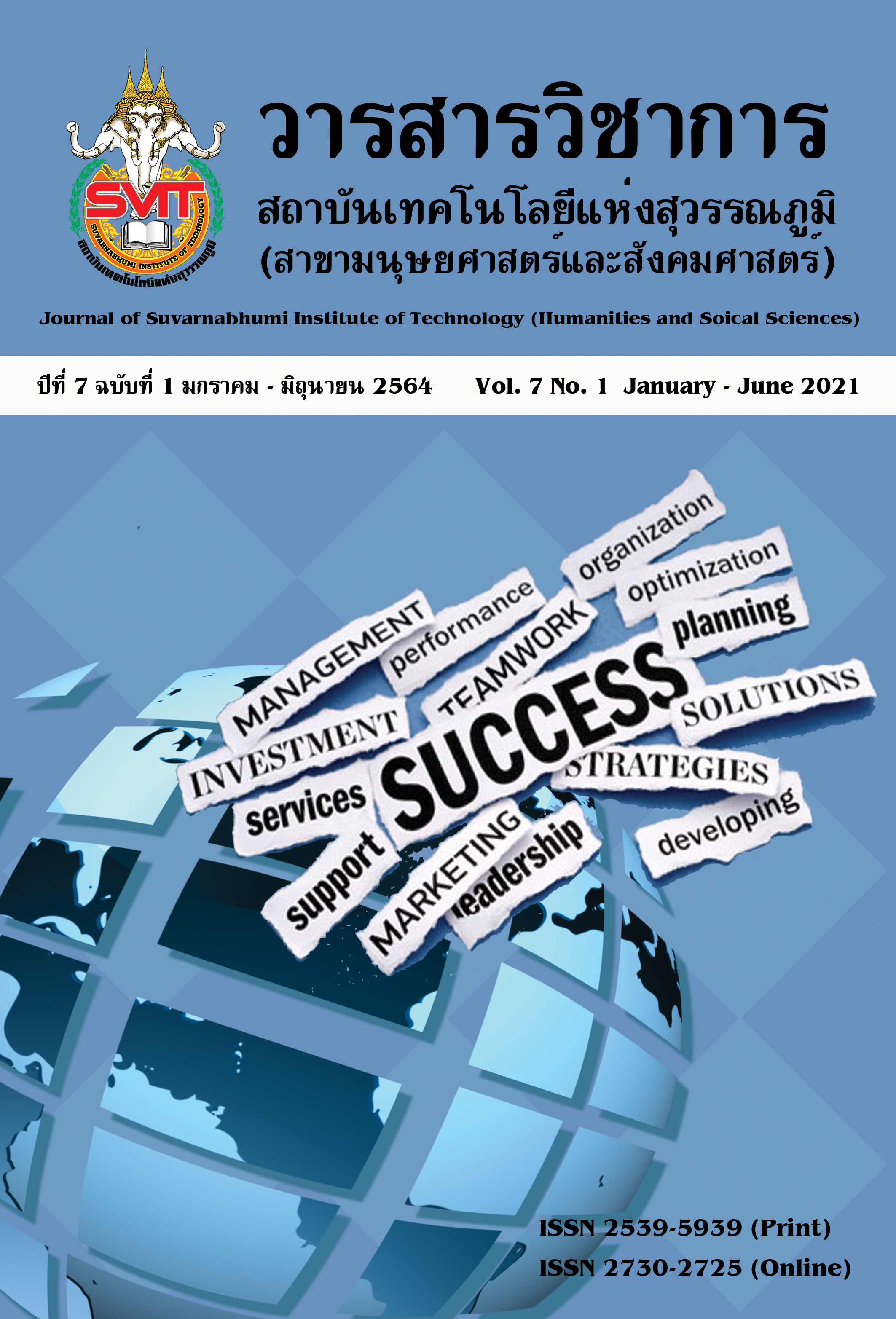A PATTERN FOR DEVELOPING A COZINESS IN TEACHER PERFORMANCE IN PRIVATE EDUCATIONAL INSTITUTIONS UNDER THE OFFICE OF NAKHON SI THAMMARAT PRIMARY EDUCATIONAL SERVICE AREA 4
Keywords:
Welfare, Performance, Private Educational InstitutionAbstract
The objective of this research is to create a model for improving the working well-being of teachers in private educational institutions.Under the Office of Nakhon Si Thammarat Primary Educational Service Area 4, the research area is a basic educational institution.Nakhon Si Thammarat Primary Educational Service Area Office 4 Sample groups consisted of 1) management 2) executive committee 3) teachers and 4) 227 educational personnel using a specific method of selection. There were 2 types of research instruments: 1) questionnaire and 2) suitability evaluation form. The data were analyzed using frequency, percentage, mean and standard deviation.The research results were found
- The pattern of developing the coziness in the performance of teachers in private educational institutions under the Office of Nakhon Si Thammarat Primary Educational Service Area 4 was a pattern for developing the well-being of teachers in private educational institutions, consistent with 9 factors: 1) Structure and management 2) Characteristics of leadership and management 3)Policy and communication 4)Work environment 5)School culture 6)Personnel quality development 7)Welfare and work balance 8)School engagement and 9)Inter-organizational involvement
- The results of the evaluation of the well-being development model in the performance of teachers in private educational institutions under the Office of Nakhon Si Thammarat Primary Educational Service Area 4, found that the patterns are plausible and useful at the most level followed by the consistency and suitability were at a high level, respectively.
References
จิรภา อินจันทร์สุข. (2560). รูปแบบการพัฒนาความผูกพันต่อองค์กรของครูในสถานศึกษาสังกัด
สำนักงานเขตพื้นที่การศึกษามัธยมศึกษาเขต 7 (ปริญญานิพนธ์ปริญญาดุษฎีบัณฑิต). มหาวิทยาลัยปทุมธานี.
ณัฏฐพันธ์ เขจรนันทน์. (2551). พฤติกรรมองค์การ. กรุงเทพฯ: บริษัท วี.พริ้นท์.
ดาวรุวรรณ ถวิลการ. (2552). วัฒนธรรมองค์การในโรงเรียนรางวัลพระราชทาน: การวิจัยเชิงชาติ พันธุ์วรรณนา. ขอนแก่น: มหาวิทยาลัยขอนแก่น.
ตะวัน สื่อกระแสร์. (2556). ยุทธศาสตร์การบริหารจัดการโรงเรียนเอกชนสู่ความเป็นเลิศ (ปริญญานิพนธ์ปริญญาดุษฎีบัณฑิต). มหาวิทยาลัยราชภัฏเชียงใหม่.
ทักดนัย เพชรเภรี.(2556). การพัฒนารูปแบบการธำรงรักษาบุคลากรโรงเรียนเอกชนประเภทสามัญ
ศึกษา. วารสารศึกษาศาสตร์มหาวิทยาลัยนเรศวร, 15(5), 8-19.
ทัศนีย์ รัตนสุวรรณ. (2560). การพัฒนารูปแบบการบริหารงานของสถานศึกษาเอกชน ขั้นพื้นฐานที่มีประสิทธิผล (ปริญญานิพนธ์ปริญญาดุษฎีบัณฑิต). มหาวิทยาลัยราชภัฎนครศรีธรรมราช.
ธีระ รุญเจริญ. (2550). ความเป็นมืออาชีพในการจัดการและบริหารการศึกษา ยุคปฏิรูปการศึกษา. กรุงเทพฯ: ข้าวฟ่าง.
นิภาพร ดีมาก, และคณะ. (2560). รูปแบบการพัฒนาบุคลากรเพื่อเสริมสร้างประสิทธิภาพการมีส่วนร่วมของชุมชน ในการจัดการศึกษาขั้นพื้นฐาน. วารสารบัณฑิตศึกษา มหาวิทยาลัยราชภัฏวไลยอลงกรณ์ ในพระบรมราชูปถัมภ์, 11(2), 87-99.
บุรเทพ โชคธนานุกูล. (2560). ปัจจัยความสุขในการทำงานและความผูกพันต่อองค์กรที่มีผลต่อความพึงพอใจในการให้บริการของบุคลากรมหาวิทยาลัยต่างรุ่นอายุ. สืบค้น 16 เมษายน 2562, จาก http://www.kmutt.ac.th/jif/public_html/article_detail.php?ArticleID=188922
พิชิต ฤทธิ์จรูญ. (2555). หลักการวัดและประเมินผลการศึกษา (พิมพ์ครั้งที่ 4). กรุงเทพฯ: เฮ้าท์ ออฟ เคอร์มีสท์.
ไพศาล อานามวัฒน์. (2556). แรงจูงใจในการปฏิบัติงานของครูในโรงเรียนคาทอลิก สังฆมณฑลจันทบุรี (วิทยานิพนธ์ปริญญามหาบัณฑิต). มหาวิทยาลัยเกษตรศาสตร์.
ภาวินทร์ ณ พัทลุง. (2560). การพัฒนารูปแบบการบริหารสถานศึกษาเอกชนสู่ความเป็นเลิศ (ปริญญานิพนธ์ปริญญาดุษฎีบัณฑิต สาขาวิชาการบริหารการศึกษา). มหาวิทยาลัยราชภัฎนครศรีธรรมราช.
วิเชียร วิทยอุดม. (2551). องค์การและการจัดการ. กรุงเทพฯ: ธนธัชการพิมพ์ จำกัด.
ศูนย์ประสานงานเครือข่ายผู้ปกครองในสถานศึกษา. (2551). ศูนย์ประสานงานเครือข่ายผู้ปกครองในสถานศึกษาประสานพลังโรงเรียนลูก=โรงเรียนเรา. สืบค้น 16 เมษายน 2562, จาก http://oknation.nationtv.tv/blog/school123/2008/03/18/entry-1
สมาน อัศวภูมิ. (2557). การบริหารสถานศึกษาตามแนวการปฏิรูปการศึกษายุคใหม่ (ฉบับปรับปรุง). อุบลราชธานี: อุบลกิจ ออฟเซท การพิมพ์
สำนักงานคณะกรรมการส่งเสริมการศึกษาเอกชน. (2551). พระราชบัญญัติโรงเรียนเอกชน พ.ศ.2550. กรุงเทพฯ: สกสค. ลาดพร้าว
สำนักงานคณะกรรมการส่งเสริมการศึกษาเอกชน.(2559). แผนพัฒนาการศึกษาเอกชน พ.ศ. 2560 - 2564 กลุ่มนโยบายและแผน. กรุงเทพฯ: สกสค. ลาดพร้าว
เสริมศักดิ์ วิศาลาภรณ์. (2552). ภาวะผู้นำ. ประมวลสาระชุดวิชาทฤษฎีและแนวทฤษฎีในการบริหารการศึกษา หน่วยที่ 5–8 (พิมพ์ครั้งที่ 9). นนทบุรี: มหาวิทยาลัยสุโขทัยธรรมาธิราช.
Drew, E., & Murtagh, E. (2005). Work/life balance: Senior management champions or laggards? Women in Management Review, 20(4), 262–278.
Glover, J. A, Burning, R, H. (2010). Educational Psychology: Principles and Application. Boston: Little, Brown.
Hoy, W.K., & Miskel, C.G. (2013). Educational administration: Theory, Research, and Practice (9 th ed.). New York: McGraw-Hill.
Lunenburg, Fred., & C.Ornstein Allan. (2012). Educational Administration: Concept and Practice (2nd ed.). New York: Wadsworth Publishing Company.
Maher, M. C., Lucas, S. E., & Valentine, J. W. (2001). A model for understanding the influence of principal leadership upon teacher empowerment as mediated by school culture. Paper presented at the meeting of the American Educational Research Association, Seattle, WA.
Marzano, R. J., Waters, T., & McNulty, B. A. (2005). School leadership that works: From research to results. Alexandria, VA: Association for supervision and development of curriculum
Pedler, M. (2010). Action Learning In Practice (4th ed.). Brookfield, Vt: Gower.
Rath, T. & Harter, J. (2012). Wellbeing the Five Essential Elements. New York: Gallup Press.
Squires, A. & Kranyik, P. (1996). The Comer program: Changing school culture. Educational Leadership, 53(4), 29-32.
Welch (2001). Seven Keys to ERP Success. Strategic Finance, 89(3), 40-61.
Yukl (1998). Leadership in Organizations. (4th Ed.). Upper Saddle River, NJ: Prentice Hall.
Downloads
Published
Issue
Section
License
The articles published are copyrighted by the Sarasas Journal of Humanities and Social Science. The opinions expressed in each article in this academic journal are those of the individual authors and do not reflect the views of Sarasas Suvarnabhumi Institute of Technology. The authors are solely responsible for all aspects of their respective articles. Any errors or inaccuracies in the articles are the sole responsibility of the authors.



